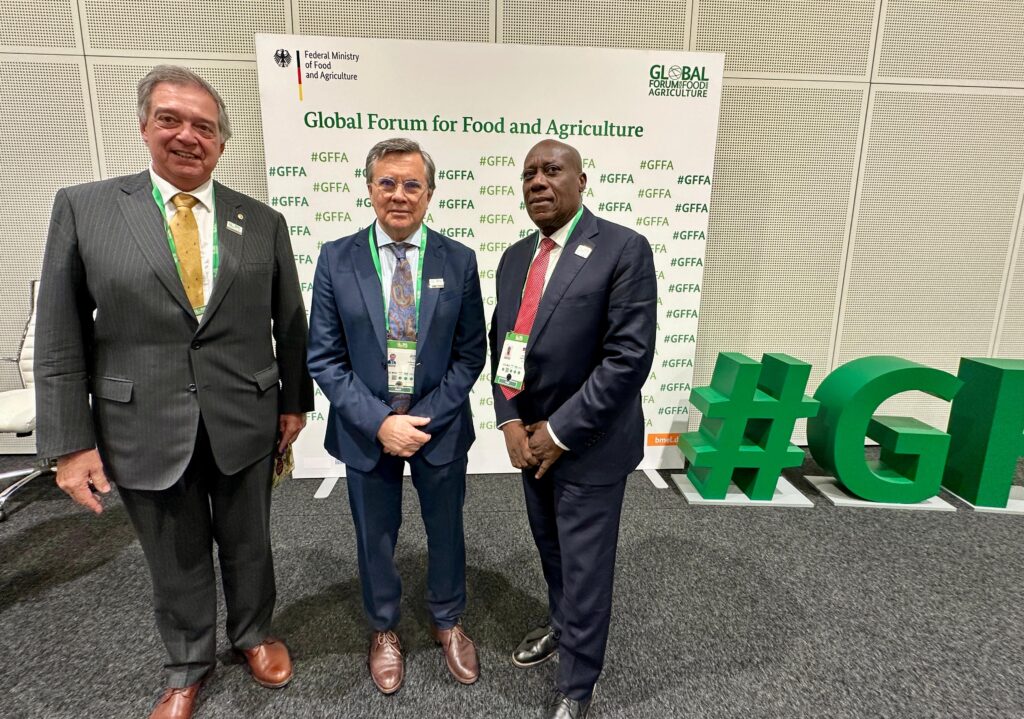While speaking at the Week of Agriculture and Food in Buenos Aires, Manuel Otero maintained that Latin America can make a significant contribution, by creating sustainable businesses.

Buenos Aires, 27 November (IICA). The Director General of the Inter-American Institute for Cooperation on Agriculture (IICA) remarked that agriculture “has enormous potential” to mitigate climate change by creating sustainable bioeconomy-based businesses, which is something to which Latin America could contribute significantly.
Participating in a panel on “Agriculture, Climate Change and the Need for a New Economic Approach” during the Week of Agriculture and Food, alongside the Minister of the Environment and Natural Resources of El Salvador, Lina Pohl, and the Coordinator of the Latin American Alliance for Rural Climate Resilience, Yolanda Kakabadse, the Director General of IICA remarked that climate change is affecting agricultural activity and impacting productivity, with an even greater effect on “family farming.”
The Week of Agriculture and Food, which was held in Buenos Aires, was organized by Argentina’s Secretariat of Agroindustry and by FAO, in partnership with IICA. The event was attended by representatives of more than 30 organizations, under the theme, “Future Challenges for Latin America and the Caribbean.”
In speaking about reducing greenhouse gas emissions, Otero remarked that agriculture is also “part of the solution” and urged Latin American and Caribbean countries to position themselves to “make a substantial contribution to mitigating climate change,” proposing that they should “give thought to a new generation of sustainable businesses.”
“As emissions decline, the efficiency per production unit increases. One of the main issues in this scenario is how to address productivity gaps, which are even more prevalent in family farming.”
IICA’s head sees bioeconomy as the most effective response to the challenges of climate change and the major changes it imposes on agriculture.
He explained that, “Bioeconomy allows us to capitalize on the biological wealth of the region, thereby strengthening production development. It fosters low-carbon development and is climate resilient. It reuses waste for productive purposes, enables the non-agricultural use of biomass, and generates more sophisticated value chains in sectors such as construction, pharmaceuticals and fashion. Rural areas may also serve as biofactories.”
He argued that this approach “transcends the traditional notion that limits agriculture to the production of commodities.” However, “it will call on us to redirect the efforts of national research institutions and joint regional programs between countries,” and also to train young men and women to “drive these agricultural businesses and venture into family farming, having been provided with the tools.”
“Family farming has the potential to revitalize rural areas, reshaping them into areas of opportunity and progress,” emphasized Otero. “There is no need to transport biomass. What we need to disseminate is knowledge and value-added products, and to transform biomass within the territories themselves.”
To this end, he stressed that the region “has 35 percent of the world’s natural stock of biological wealth that must be exploited and transformed into more sophisticated value-added products.”
IICA’s head emphasized the importance that the institution of the Inter-American system places on its Bioeconomy and Production Development program and also insisted that, “Our continent has everything to guarantee the food security and sustainability of the planet. It will be incumbent on us to overcome the obstacles created by climate change, by creating businesses for sustainable development. We have been blessed with these resources and the issue is how to take advantage of them, by introducing long-term sustainable strategies.”
More information:
Institutional Communication Division of IICA










